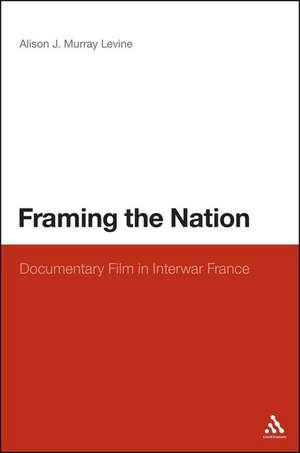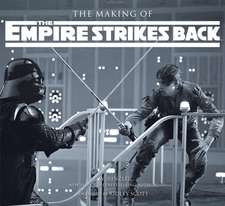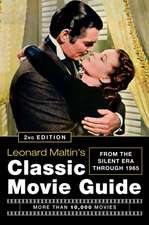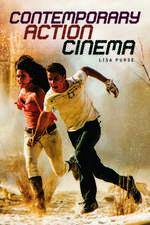Framing the Nation: Documentary Film in Interwar France
Autor Alison J. Murray Levineen Limba Engleză Paperback – 2 noi 2011
Framing the Nation: Documentary Film in Interwar France argues that, between World Wars I and II, documentary film made a substantial contribution to the rewriting of the French national narrative to include rural France and the colonies. The book mines a significant body of virtually unknown films and manuscripts for their insight into revisions of French national identity in the aftermath of the Great War. From 1918 onwards, government institutions sought to advance social programs they believed were crucial to national regeneration. They turned to documentary film, a new form of mass communication, to do so.
Many scholars of French film state that the French made no significant contribution to documentary film prior to the Vichy period. Using until now overlooked films, Framing the Nation refutes this misconception and shows that the French were early and active believers in the uses of documentary film for social change - and these films reached audiences far beyond the confines of commercial cinema circuits in urban areas.
Many scholars of French film state that the French made no significant contribution to documentary film prior to the Vichy period. Using until now overlooked films, Framing the Nation refutes this misconception and shows that the French were early and active believers in the uses of documentary film for social change - and these films reached audiences far beyond the confines of commercial cinema circuits in urban areas.
| Toate formatele și edițiile | Preț | Express |
|---|---|---|
| Paperback (1) | 257.03 lei 6-8 săpt. | |
| Bloomsbury Publishing – 2 noi 2011 | 257.03 lei 6-8 săpt. | |
| Hardback (1) | 890.28 lei 6-8 săpt. | |
| Bloomsbury Publishing – 21 apr 2010 | 890.28 lei 6-8 săpt. |
Preț: 257.03 lei
Preț vechi: 330.95 lei
-22% Nou
Puncte Express: 386
Preț estimativ în valută:
49.18€ • 51.35$ • 40.61£
49.18€ • 51.35$ • 40.61£
Carte tipărită la comandă
Livrare economică 15-29 aprilie
Preluare comenzi: 021 569.72.76
Specificații
ISBN-13: 9781441139634
ISBN-10: 144113963X
Pagini: 238
Ilustrații: 15
Dimensiuni: 156 x 234 x 13 mm
Greutate: 0.34 kg
Editura: Bloomsbury Publishing
Colecția Continuum
Locul publicării:New York, United States
ISBN-10: 144113963X
Pagini: 238
Ilustrații: 15
Dimensiuni: 156 x 234 x 13 mm
Greutate: 0.34 kg
Editura: Bloomsbury Publishing
Colecția Continuum
Locul publicării:New York, United States
Caracteristici
By covering a little-known aspect of French culture between the Wars, this book appeals to scholars and students in both French Studies and Film Studies.
Notă biografică
Alison J. Murray Levine is Assistant Professor of French at the University of Virginia.
Cuprins
1. An Introduction
2. Truth Peddling: Documentary Film in Interwar France
3. "The Revolt of the Beets": Educational Film in Rural France
4. "Model Native Villages:" Educational Film in the French Colonies
5. "Mysterious and Subtle Cheesemaking": Filming Rural France
6. "Carcasses of Manioc-Eaters": Filming Colonial France
7. Conclusion: Recycling Rural Images - The Vichy Propaganda Machine
Recenzii
"In her thoughtful and well-researched new study Framing the Nation, Alison Murray Levine argues convincingly that the French government used documentary film to help craft national identity in response to domestic and international crises during the interwar period. In doing so, the author demonstrates that state-sponsored French documentary cinema from the 1920s and 1930s serves as a repository for prevailing official discourses around modernization, urbanization, and colonialism. The author examines those discourses -- and the policy decisions to which they led -- in light of the international growth of documentary film as a flourishing new medium. Indeed, Murray Levine does a great service by situating the French contribution to documentary cinema in its proper place in the history of the medium." Andrew Sobanet, Associate Professor of French, Georgetown University
"Murray Levine traces the rise of nonfiction educational film in France during the 1920s, and the impact of the new genre on society. Film historians assert that the overall contribution of France to the development of documentary film was negligible before World War II, but she argues that the interwar examples were in fact of great importance then and remain of great interest now. Her topics include truth peddling, educational film in rural France, educational film in the French colonies, filming the French regions, filming colonial France, and the Vichy propaganda machine." -Eithne O'Leyne, BOOK NEWS, Inc.
Framing the Nation is a most welcome publication. Interwar documentary has previously been overwhelmingly and undeservedly neglected by scholars of French film. This book makes up for that neglect in no uncertain terms. It is lucid, thoroughly researched and insightful. The productive way it is able to bring together text and context, ideology and political economy is quietly impressive and the kind of prehistory it provides for later and better known French documentary makes it required reading. --Martin O'Shaughnessy, Professor in Film Studies, Nottingham Trent University
"...A sound and carefully-crafted addition to French and film history of the entre-deux-guerres, and one that will certainly be of use to scholars and students in these fields."--H-France
"Murray Levine traces the rise of nonfiction educational film in France during the 1920s, and the impact of the new genre on society. Film historians assert that the overall contribution of France to the development of documentary film was negligible before World War II, but she argues that the interwar examples were in fact of great importance then and remain of great interest now. Her topics include truth peddling, educational film in rural France, educational film in the French colonies, filming the French regions, filming colonial France, and the Vichy propaganda machine." -Eithne O'Leyne, BOOK NEWS, Inc.
Framing the Nation is a most welcome publication. Interwar documentary has previously been overwhelmingly and undeservedly neglected by scholars of French film. This book makes up for that neglect in no uncertain terms. It is lucid, thoroughly researched and insightful. The productive way it is able to bring together text and context, ideology and political economy is quietly impressive and the kind of prehistory it provides for later and better known French documentary makes it required reading. --Martin O'Shaughnessy, Professor in Film Studies, Nottingham Trent University
"...A sound and carefully-crafted addition to French and film history of the entre-deux-guerres, and one that will certainly be of use to scholars and students in these fields."--H-France














